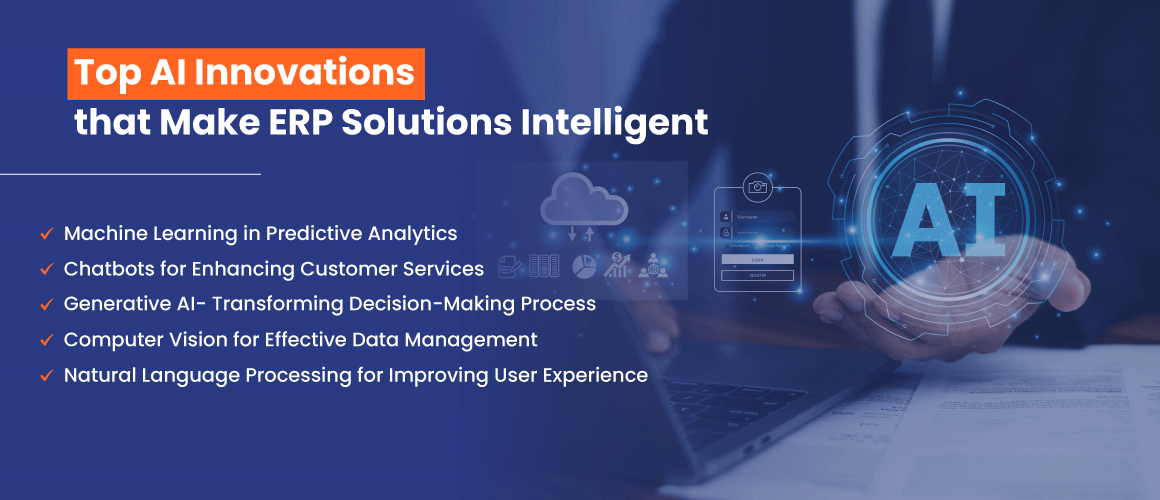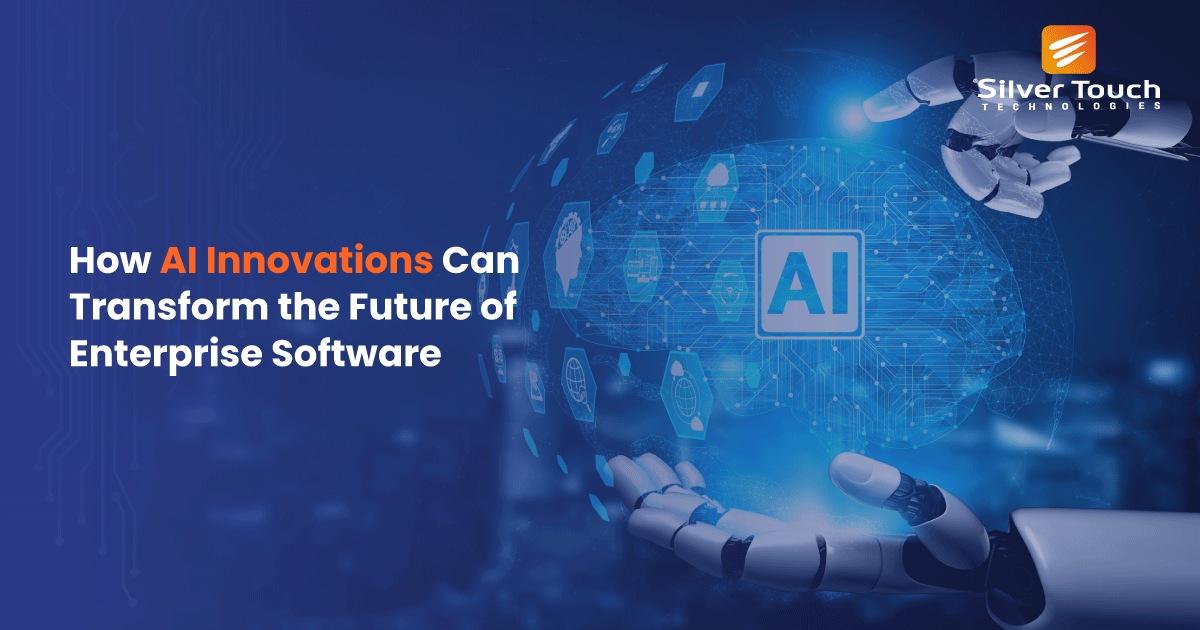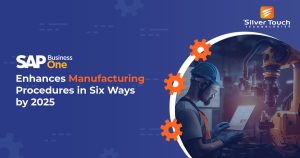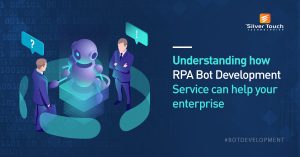The implementation of AI in ERP is gaining fame rapidly in the corporate world. This futuristic technology can make Enterprise Resource Planning (ERP) systems more intelligent and capable of supporting complex business operations. On one hand, ERP software can manage core functions, and on the other hand, AI introduces smarter automation and deeper insights. In this post, we will dig deep into the scope of AI-powered ERP systems with some AI innovations.
Let’s understand the role of AI in modern ERP systems.
Role of AI in Modern ERP Systems
AI adoption has increased manifold with the advent ot Generative AI models like ChatGPT. Today, no business can overlook AI for attracting and retaining customers. Every enterprise wants to leverage the advantage of this technology, and intelligent ERP solutions have made it possible by infusing AI capabilities.
When ERP systems combine with AI, they can offer various functionality based on various advanced technologies. For example, an AI ERP system may offer machine learning algorithms, Generative AI, predictive analytics, and natural language processing capabilities. AI in ERP is useful for streamlining complex workflows, automating processes, and increasing accuracy.
Let’s understand the scope of five popular AI innovations in tailored ERP solutions.
Top AI Innovations that Make ERP Solutions Intelligent

AI is evolving to bring disruptive changes in various industry sectors. This revolutionary technology has started touching every aspect of our personal and professional lives. In such a scenario, how about discussing its top innovations that can make tailored ERP solutions intelligent? These top AI innovations include
Machine Learning in Predictive Analytics
ML or Machine Learning is a subset of AI technology. It works wonders with predictive analytics. Machine learning can utilize vast amounts of data to anticipate market trends and potential outcomes. As a result, companies can improve their strategic planning and stay away from any unwanted situations like shortages or overstocking.
Predictive analytics in combination with ML can improve customer service and offer accurate demand forecasting. Both these innovations can make ERP solutions ready for the future.
Chatbots for Enhancing Customer Services
AI-enabled chatbots can resolve FAQs quickly to improve user interactions and assist companies in managing vast amounts of customer inquiries efficiently. Advanced chatbots have predictive analytics capability for anticipating customer requirements and increasing operational efficiency. It can give prospects or customers a more personalized experience.
Chatbots can give real-time data with actionable insights to customers based on their interests and preferences. This can significantly improve the support service.
Generative AI- Transforming Decision-Making Process
Generative AI offers deeper insights and actionable intelligence across various processes to improve decision-making. Sophisticated data analysis assists companies in strategic planning, whereas automation in routine tasks related to inventory management can save time. It also saves effort and money for companies.
Generative AI can increase efficiency by offering predictive and real-time insights. Businesses can get a virtual assistant through Generative AI that assists them in making strategic decisions.
Computer Vision for Effective Data Management
This AI innovation can revolutionize data management and streamline complex operations. When it comes to processing visual data, this innovation works efficiently and quickly. ERP solutions with built-in computer vision can improve inventory management significantly. It can automate data extraction and increase accuracy.
Moreover, companies can leverage the advantage of real-time monitoring and analysis of inventory. This monitoring can help them manage supply chains and eliminate issues like shortages.
Natural Language Processing for Improving User Experience
Natural Language Processing (NLP) enables AI-based ERP systems to process language to enhance customer service and optimize supply chain processes. As a result, companies can increase operational efficiency and allocate their resources easily. Moreover, modern businesses utilize NLP for performing routine tasks to save time and deliver tailored services to their customers.
NLP with ERP is useful for offering personalized experiences to customers in their own languages. It can further boost their experiences.
See Real Results – Generative AI Solutions for Public Sector Transformation
How AI in ERP Offers Industry-Specific Solutions
AI-powered ERP systems offer numerous industry-specific benefits. For example, the manufacturing sector can optimize supply chain operations through AI-driven demand forecasting and get real-time inventory data. It ensures a reduction in waste products and improved operational efficiency.
The retail sector can enhance customer experience by leveraging natural language processing and even Generative AI. Virtual assistants can interact with customers or prospects on a 24/7 basis and manage relationships with personalized experiences. It leads to improved customer service and higher satisfaction.
The healthcare sector is another major beneficiary of combining AI and ERP. This sector can allocate its resources efficiently and automate routine tasks with AI-ERP solutions. This enables medical professionals to focus more on patient care. Moreover, AI can give actionable insights into patient data for improving healthcare services.
Future Trends of the Evolution of ERP with AI
AI-powered ERP systems are here to stay. Talking about the future trends, three innovations, predictive analytics, virtual assistants, and ERP data analysis AI, will take ERP solutions to a new level. AI-based innovations will assist companies in supply chain optimization, resource allocation, customer services, and inventory management more accurately. Along with these trends, more focus will remain on NLP models and data security.
As AI technology brings several challenges related to privacy protection and data security, ERP solution providers will consider these challenges. We can expect more powerful and secure AI-based ERP systems in the future.
Concluding Lines
A feature-rich ERP system can be a game-changer for modern businesses. When AI and ERP combine to bring intelligent ERP solutions, we can get many business benefits. Some of these benefits include increased efficiency and improved customer service with better resource allocation. We can expect more accurate and secure ERP solutions with AI functionality in the coming years.
Silver Touch Technologies UK offers intelligent ERP solutions to global enterprises. Our in-house team of experienced developers can integrate AI advancements into tailored ERP solutions to meet diverse business requirements effectively. Contact us to learn more about the scope and benefits of the AI and ERP combination for your company.
FAQs About AI in Enterprise Software
An AI-powered ERP system works using artificial intelligence technologies like machine learning and natural language processing to automate tasks, improve decision-making, and enhance overall business processes.
Yes, AI ERP systems can be suitable for small and mid-sized companies, offering scalable solutions that can optimize operations and provide valuable insights.
Generative AI can create realistic synthetic data for testing, automate content generation for reports, and potentially assist with customised workflows in ERP systems.
AI helps with ERP data analysis by identifying patterns, predicting trends, automating reporting, and providing actionable insights from the vast amounts of data.
You can consider your business needs, data readiness, integration capabilities with existing systems, and the potential return on investment before implementing an AI ERP system.





